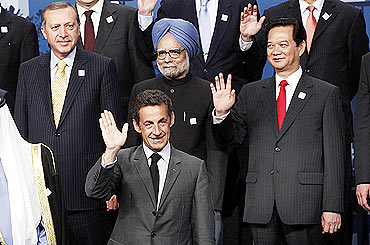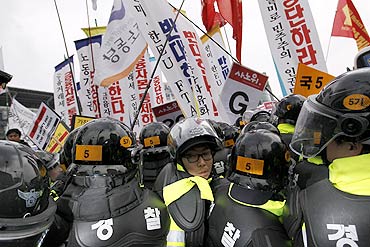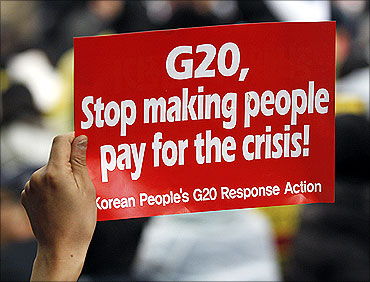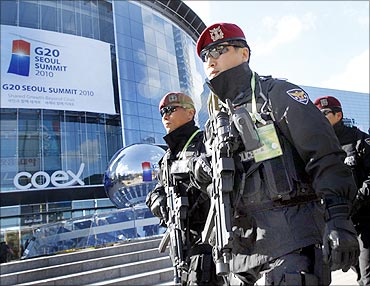Photographs: Chris Wattie/Reuters Saisuresh Sivaswamy in Seoul
Prime Minister Dr Manmohan Singh on Friday called for investing surplus savings in developing countries, to not only address the immediate demand imbalance but also help address developmental imbalances.
In his keenly addressed speech at the Seoul G20 plenary, Dr Singh emphasised that the world's most developed nations should 'leverage imbalances of one kind to redress imbalances of the other kind.'
Pointing out that developing countries performed well in the years before the crisis and also done well in subsequent years, Dr Singh pointed out that we need to ensure that the global economic environment, including especially the environment for trade, and investment flows, remain strongly supportive of development.
. . .
Competitiveness is key to growth: PM
Image: South Korean police struggle to stop demonstrators during an anti-G20 protest in downtown Seoul.Photographs: Damir Sagolj/Reuters
Admitting that the fractious-sounding G20's discussions on the state of the world economy revealed a 'mixed picture', Dr Singh said the good news was that industrialised countries have resumed growth in 2010.
Despite that, output gaps remain large and unemployment is still at crisis levels, the prime minister said.
Returning to the point he made in his statement on the eve of his departure for G20, Dr Singh said that high unemployment in industrialised nations threatened a revival of protectionist sentiment, 'especially since the use of conventional monetary and fiscal tools to revive the economy has been exhausted'.
. . .
Competitiveness is key to growth: PM
Image: A demonstrator holds up a sign during an anti G20 protest in downtown Seoul.Photographs: Jo Yong-Hak/Reuters
Efforts to rebalance the world economy was bedeviled by the unsustainable current account deficits sustained by developed nations, which can only be offset by reducing current account surpluses elsewhere, the prime minister said.
This, again, is not easy to agree upon "given the structural differences across countries, the many uncertainties that prevail, and the multiple goals that each country has to balance."
The points of broad agreement among the 19 member-nations, Dr Singh said, were avoiding competitive devaluation and resisting any resurgence of protectionism; advanced deficit countries to follow policies of fiscal consolidation consistent with their individual circumstances so as to ensure debt sustainability over the medium term; structural reforms, while necessary , should increase efficiency and competitiveness in deficit countries, while expanding internal demand in surplus countries; reserve currency countries have a special responsibility to ensure that their monetary policies do not lead to destabilising capital flows, which can put pressure on emerging markets.
. . .
Competitiveness is key to growth: PM
Image: Armed policemen patrol outside a venue of the G20 Seoul Summit in Seoul.Photographs: Lee Jae-Won/Reuters
Dr Singh then went on to add his prescription to what he called were well known ingredients: "Even as we try to avoid a destabilising surge of volatile capital flows to developing countries, there is a strong case for supporting long term flows to these countries to stimulus investment, especially in infrastructure."
Making a pitch for sub-Saharan Africa, Dr Singh told the gathered heads of state that these countries are now in a position to absorb capital flows aimed at an expansion in investment, which would inject much needed demand into the global economy.
The Mutual Assessment Process adopted in Pittsburgh was a unique G20 initiative to achieve the coordination needed for this, the prime minister said.
"The G20 would convey a powerful signal to markets if we commit ourselves to a second-stage MAP process aimed at coordinating policies in these areas."





article